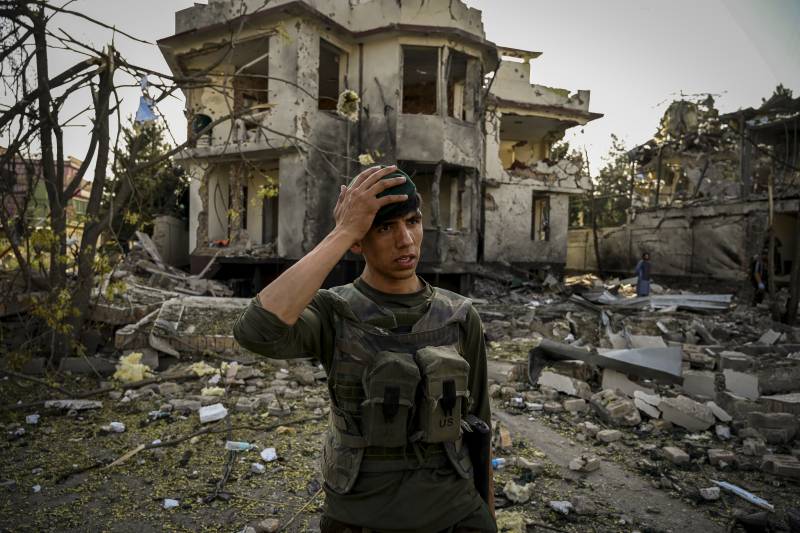Afghanistan slipping: Risks and choices for Pakistan

Stay tuned with 24 News HD Android App

As Taliban forces advance against Afghan forces, Pakistan finds itself in a difficult place. The United States’ expectations from Pakistan regarding instructing the Taliban are unrealistic. Kabul wants Pakistan to ensure a Taliban retreat and defeat – a feat the world’s superpower and all its allies failed to manage in two decades. In varying degrees most countries expect Pakistan, the Taliban’s original mentor, to rein them in.
Pakistan’s repeated message, even to the top security officials in Washington has been clear. Pakistan has and will continue to cooperate in all efforts for peace-making in Afghanistan. Since peace is as important for Pakistan if not more than it is for other countries, Pakistan as before will continue to influence the Taliban and bring them to the negotiating table. War-torn Afghanistan poses the gravest danger to Pakistan. It will be a repeat of the nightmare of the 80’s-onwards if civil war spreads and an additional flow of refugees becomes imminent. We can’t take more refugees, was Pakistan's clear message last week in Washington.
Washington essentially opted for a ‘cut-and-run’ policy from Afghanistan. It has positioned itself by leading the expectation brigade calling on Pakistan to ‘deliver’ Taliban ceasefire. In Delhi last week, US Secretary-of-State Blinken’s message was old: we hope Pakistan will deliver the Taliban.
As Pakistan struggles with the dilemma of being asked to do more to bring the Taliban to the negotiating table and to accept Ashraf Ghani’s role as a follow-up to the Doha agreement, multiple players including foreign governments, diplomats, propagandists and social media entities have asked Islamabad to end its ‘double game’ and ‘double-speak.’ They claim Pakistan supported men crossing over to support Taliban to fight Afghan forces. Aggressive claims are made using alleged lists of Taliban fighters moving from Pakistan to fight. These allegations ape charges the Afghan President made in Tashkent, of Pakistan allowing 10,000 Taliban to cross the border. The Pakistani PM has emphatically refuted the claim as did his intelligence chief in a subsequent meeting.
Cross-overs from Pakistan are unavoidable given geography, history, sociology of conflict, the 3,000 km border made porous over 40 years of post Soviet-invasion crossings and common tribes, and indeed no less, the press of three million Afghan refugees. The environment is not sanitized against the involvement in conflict of Pakistan-based Afghans and TTP’s Pakistani supporters. Mostly refugees cross over travelling to districts hundreds of kilometers beyond the Pak-Afghan borders demonstrating Afghan difficulty in controlling their movement.
Myriads of factors involving all its neighboring countries create the unusually complex Afghan conflict situation. It’s foolhardy after the collective making of this chaotic reality to now be finger-pointing at Pakistan. Seeking a neat and controlled roadmap to peace is like wanting to put together a broken egg.
Pakistan is seeking to push ahead on the diplomatic track. Against the backdrop of Taliban’s rapid military advances, Pakistan is facing shades of diplomatic challenges. On the one hand Pakistan is urgently seeking close and active regional coordination to jointly work out diplomatic and political strategies to stop the Taliban onslaught and negotiate an inclusive interim set up in Afghanistan. While pinning hopes on the Extended Troika meeting scheduled for August 11 in Doha, Islamabad has been engaged bilaterally with envoys from China, Russia, Iran, Germany and others to develop common approaches to put pressure on Taliban, plus to expand the political space in Kabul for broader intra-Afghan engagement by easing out Ghani.
The early signs of Taliban entry into some of the towns including Spin Boldak have been disturbing. According to US and UK Afghanistan-based diplomats, Taliban killed civilians in vendetta killings. Some public hangings in Helmand have also been reported. The Taliban of the late 90’s will find acceptability in 2021 almost impossible.
The game-changer in the four decades of Afghan-infighting with external support will be genuine coordination among yesterday’s proxy-masters. The Taliban Shura will engage on the question of stopping military activity only if the regional neighbors in the Doha framework share a more elaborate political map reallocating power beyond the Ghani setup to all Afghan players.
Equally important is for the Doha process to be expanded and to include all relevant international and regional players willing to draw up two plans for Kabul-Taliban. One with terms for an interim inclusive setup and another with terms for an international diplomatic and financial leverage plan to be used against the Taliban in case they are not politically accommodating of other Afghan stakeholders.
Taliban‘s military activity is bound to continue at a reduced level until a political plan for the interim setup is not finalized. Kabul cannot gain what it lost in the battlefield whereas Taliban are clearly poised to gain some of what was denied to them at Bonn twenty years ago...Taliban will have to stop to conquer in this round. There can be no clear winners- the binary does not exist. And Ashraf Ghani for now seems to be unaware of this fact. Washington and the regional players will have to aid Ghani on the path of realism.
Afghanistan’s success cannot be a solo act, and neither can failure to bring peace be a solo loss. Making Pakistan a lone scapegoat for the current Afghan mess is simply contrafactual.
– Nasim Zehra is an author, analyst and national security expert.
Twitter: @NasimZehra
Courtesy: Arab News
